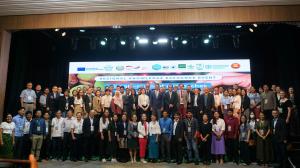
United for Sustainability: Stakeholders Validate Priority Actions for ASEAN’s Green Agriculture
Over 100 delegates validated key actions to achieve net-zero emissions by 2050 in ASEAN, focusing on sustainable agriculture during a workshop in Phnom Penh.
PHNOM PENH, CAMBODIA, June 24, 2024 /EINPresswire.com/ -- The Association of Southeast Asian Nations Climate Resilience Network (ASEAN CRN), in collaboration with key partners, including the European Union (EU) through the Enhanced Regional EU-ASEAN Dialogue Instrument (E-READI), has successfully validated seven priority actions deriving from the ASEAN carbon neutrality guidelines. The guidelines and priority actions will propel ASEAN’s journey to net-zero emissions by 2050.The seven priority areas include: adopting low-carbon practices and technologies; promoting diet changes; implementing carbon pricing, trading schemes, and taxes; enhancing carbon sequestration; reducing damage and waste; supporting higher climate ambitions; and lastly, boosting sectoral livelihoods and resilience.
Priority actions were identified during a regional knowledge-sharing event on ’Climate-resilient approaches in regional commodity value chains’ held on June 19-20, 2024, in Phnom Penh, Cambodia. Over 100 delegates, including representatives from ASEAN Member State governments, agricultural experts, commodity producers, agricultural cooperatives, key farmers' organisations, the private sector and international development partners, gathered to review the newly launched ASEAN Carbon Neutrality guidelines and validate its priority actions, steering the region’s path to reducing carbon emissions and combating climate change.
In his opening remarks, H.E. Kop Roly, Undersecretary of State, Cambodian Ministry of Environment, emphasised the need for sustainable approaches in the agriculture sector. ‘Agriculture remains a cornerstone of our economies, providing livelihoods to millions across Southeast Asia. However, this vital sector is increasingly vulnerable to climate change. Exploring innovative strategies and validating critical frameworks such as the ASEAN Carbon Neutrality Guidelines for Agriculture will be instrumental in shaping policies and practices that enhance the resilience of our agricultural sectors.’
Southeast Asian countries have all signed the Paris Agreement to limit the planet's warming to 1.5 degrees above pre-industrial levels. Since September 2022, the EU, through E-READI, has supported the development of the ASEAN Guidelines for Carbon Neutrality in Agriculture. This recognises that agriculture contributes to climate change, but also offers solutions to reach net zero targets.
A comprehensive sectoral study supported by the ASEAN Secretariat and the EU through E-READI facilitated the design of the guidelines, where priority actions were identified. This sectoral study feeds into the overall ASEAN Carbon Neutrality Strategy, which comprises the sectors of Energy, Transport and Agriculture. The event also focused on improving participants' understanding of low-emission agriculture and land use, the Enhanced Transparency Framework, and carbon market opportunities, particularly in the rice and forestry sectors.
Additionally, stakeholders collaborated on climate-resilient practices and showcased innovative approaches to producing and marketing climate-smart commodities. The event facilitated exercises to ensure that the carbon neutrality in agriculture guidelines were practical and actionable, focusing on operationalising the validated priority actions. Exercises included identifying responsible actors, needed support, mapping relevant initiatives, and scaling up needs, resulting in identifying priority actions for 2030, 2050 and beyond.
The validation workshop was part of the ASEAN CRN Regional Knowledge Exchange Event organised by GIZ Cambodia. The overall event was a collaboration between E-READI, the GIZ project Strengthening Climate Resilience in Agricultural Systems (CRAS), the ASEAN Secretariat, the ASEAN CRN, the Foundation of Netherlands Volunteers / Stichting Nederlandse Vrijwilligers (SNV Vietnam), FAO, and other partners.
About ASEAN
The Association of Southeast Asian Nations (ASEAN) was established on 8 August 1967. The Member States of the Association are Brunei Darussalam, Cambodia, Indonesia, Lao PDR, Malaysia, Myanmar, Philippines, Singapore, Thailand and Viet Nam. On 31 December 2015, the ASEAN Community was formally established. The ASEAN Secretariat is based in Jakarta.
About the European Union (EU)
The European Union (EU) is the economic and political union of 27 Member States with a population of 447 million. Together, the EU has built a zone of stability, democracy and sustainable development while maintaining cultural diversity, tolerance and individual freedom. In 2012, the EU was awarded the Nobel Peace Prize for advancing the goals of peace, reconciliation, democracy and human rights in Europe. The EU is the world's largest trading bloc, and the world's largest source and destination of foreign direct investment. Collectively, the EU and its Member States are the largest donors of Official Development Assistance (ODA), providing more than half of ODA globally.
The 27 Member States of the EU (in protocol order) are: Belgium, Bulgaria, Czech Republic, Denmark, Germany, Estonia, Ireland, Greece, Spain, France, Croatia, Italy, Cyprus, Latvia, Lithuania, Luxembourg, Hungary, Malta, Netherlands, Austria, Poland, Portugal, Romania, Slovenia, Slovakia, Finland and Sweden.
For more information about the EU and its relations and cooperation with ASEAN, access http://eeas.europa.eu/asean.
Contact details:
E-READI: ereadi@asean.org
Delegation of the European Union to ASEAN: delegation-asean-info@eeas.europa.eu
ASEAN Secretariat: NRU@asean.org, media@asean.org
Dino Dans
Enhanced Regional EU-ASEAN Dialogue Instrument (E-READI)
email us here
Distribution channels: Agriculture, Farming & Forestry Industry, Business & Economy, Environment, Human Rights, Natural Disasters
Legal Disclaimer:
EIN Presswire provides this news content "as is" without warranty of any kind. We do not accept any responsibility or liability for the accuracy, content, images, videos, licenses, completeness, legality, or reliability of the information contained in this article. If you have any complaints or copyright issues related to this article, kindly contact the author above.
Submit your press release
